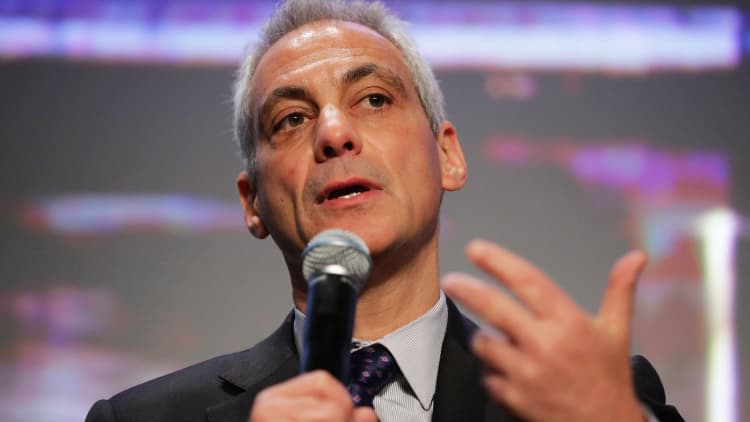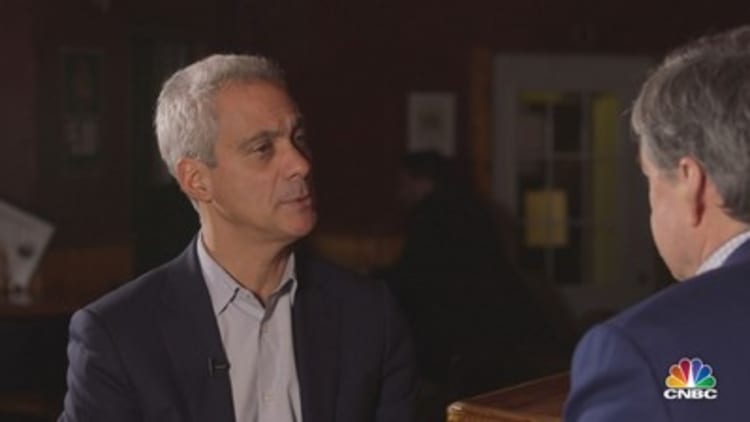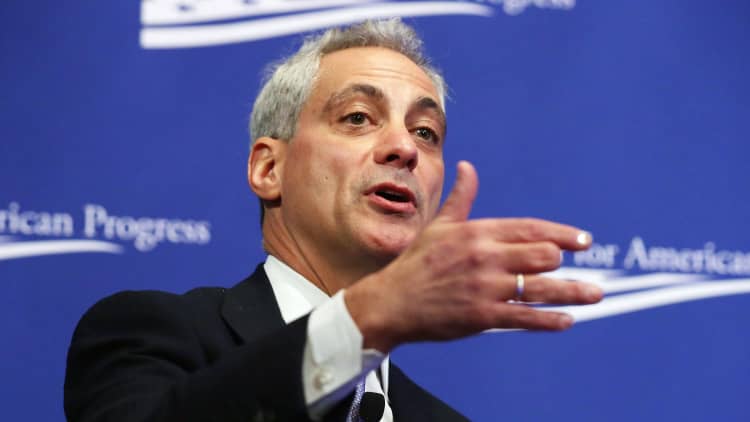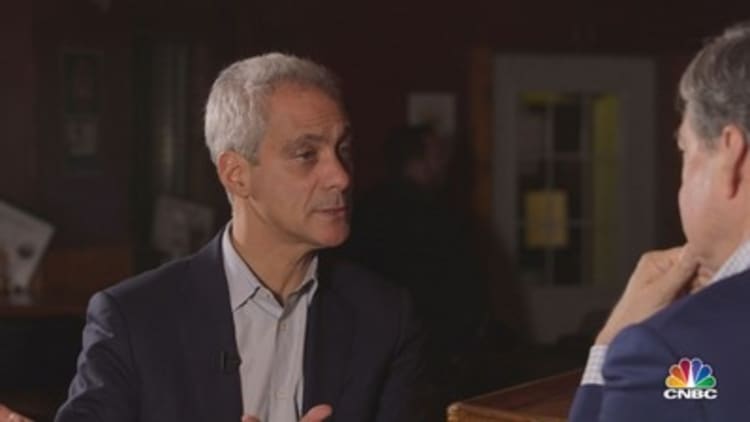
At age 57, Rahm Emanuel boasts a remarkably broad set of experiences for evaluating the young administration of President Donald Trump. He served in Bill Clinton's White House and ran Barack Obama's as chief of staff.
As a member of Congress, he helped Democrats win back control of the House in 2006. As mayor of America's third-largest city, Emanuel huddled in December with the president-elect at Trump Tower in New York. Yet he's also been the target of Trump's barbs over surging gun violence and the "sanctuary" Chicago provides illegal immigrants.
Emanuel sat down to discuss the new president over a beer in a tavern near Wrigley Field. What follows is a condensed, edited transcript of their conversation.
HARWOOD: You met with Donald Trump. What was he like?
EMANUEL: That's a different moment when you become president. And it kind of comes upon you in one sudden rush and then in waves.
I think the jury is out whether this is the early stage — kind of a learning process — that goes on in any White House when you first arrive. Or this is, because of the style and the improv, just going to be constant like this. And the jury is out about which one it is.
I used to say to President Clinton, when I was his senior advisor, that if we knew in the first year of the first term what we knew by the first year of the second term we'd be geniuses. There's nothing like having been there.
HARWOOD: What is the attitude that you think Democrats should take to Donald Trump? Is it one of massive resistance or is it looking for places to cooperate?
EMANUEL: We should express ourselves. My general attitude is, cooperate where you can, but confront when you must.
HARWOOD: You said Democrats need to take a chill pill. What did you mean by that?
EMANUEL: This is a marathon, it's not a sprint. This is not going to just turn around in 2018. Don't just bet that he's going to collapse.
We have to have ideas, real answers to challenges that people are facing. You have to have the political capacity and staying power and stamina.
HARWOOD: Did Obama and people like you dig the hole the Democrats are in?
EMANUEL: There's other forces besides the Obama presidency. The technology, global economy, stagnant incomes that played a big role. But you've also got to look at, what were the political implications of policies, and were there political upsides or downsides?
HARWOOD: Let me ask you what you think is going to happen to three signature legacies of the president. Obamacare, which Republicans are struggling with repealing, replacing now. Dodd-Frank. And you already talked about the Dreamers.
EMANUEL: I don't think the president will touch Dreamers. Dodd-Frank, I think they are going try to fundamentally undermine it. I think not just in the consumer office, but the Volcker Rule, how much cash banks have to have, the kind of checkup to make sure that they're healthy.
Of the three you're talking about I think that's the one that's most vulnerable.
HARWOOD: More than Obamacare?
EMANUEL: They're finding out that President Obama's health-care plan is a puzzle. This is just not that easy. Each of these changes exposes fault lines within the Republican Party.
And they're going to realize, there's only so much you can do. It's going to be easier to get a consensus around taxes than it is health care.
HARWOOD: Do you see them having to choose between a Goldman agenda and a "Joe six-pack" agenda?
EMANUEL: Well, look, every president always has tensions in the electoral coalition they put together. If you think about his coalition, there would be more unity around an infrastructure set of ideas — both from businesses who think it's good for the economy, and the blue-collar support because it's going to put blue-collar people to work building these roads, building these schools, building these mass transit systems, the airports, etc.
We don't know the contours of their tax deal. My assumption is it's going to skew [toward the] top. [There are] reforms to be done on the corporate side.
But there are things to be done on the earned income tax credit, if they wanted to do something that was more unified. I could argue for fundamental reforms on the corporate side, with fundamental reforms on working family side.
That could [make] a really broad-based coalition. It would have a significant impact on the economy without hobbling us with massive amount of debt. The biggest threat he has now, potentially, is uncertainty.
HARWOOD: Do you see either half of his coalition breaking away from him?
EMANUEL: I'm going to be honest. One of the things that's surprised me? You know I worked for President Clinton, spearheading the effort to get NAFTA done. In Congress, I voted for trade deals. I support President Obama's Asia-Pacific deal.
I'm amazed at big business' silence about this. After [President Trump] pulled out of the TPP, you act like it's an unfortunate accident. Maybe it's the lure of the tax cuts.
I really now want to know how sincere you were about how important globalization is. I still believe in the promise of globalization, with real investments in infrastructure, training, etc.

HARWOOD: What attitude should urban America take?
EMANUEL: He constantly is running down urban America.
In that meeting in December, I said, 'Mr. President, you're an investor in Chicago. ' 'I love my building – waterfront.' I said, 'You're an investor in New York. You're an investor in D.C.' He said, 'Yeah.'
I said, 'OK. Well, they're all sanctuary cities. You're not investing in non-sanctuary cities, so you must see something dynamic about what urban America has to offer.' I tried to take a different approach to that question.
We welcome people from all over. You are safe and secure here. Back in 1850, which city do you think passed an ordinance to say that they weren't going to cooperate with the federal government on the Fugitive Slave Law? Only city in the United States.

HARWOOD: Bottom line, you don't think he's going to take your federal funds?
EMANUEL: He's going to work with cities because they're the major economic engine of the American economy. And at the end of the day, a president gets valued by whether an economy's growing and creating jobs or not.
HARWOOD: Is the level of violence, gun violence in particular, that has been experienced in Chicago, is that an indication of failure on your part, and do you expect that he is going to somehow send in the feds?
EMANUEL: I would love to have more help. A lot of people think it's just about law enforcement.
Obviously, I'm the mayor, so I'm accountable. But this also relates to another issue. Mayors — we all talk about it. San Jose's up 60 percent. San Diego's up 80 percent. San Antonio's up 49 percent. Philadelphia's up 61 percent. Baltimore is up. Indianapolis, where the vice president's from, highest homicide rate in the history of Indianapolis. Memphis, same thing.
But walking around saying, 'The only thing you have to do is get tough,' is also not a real answer. This is a complex problem that requires a comprehensive solution.
HARWOOD: Did Reince Priebus ask you for advice on how to do the job as chief of staff?
EMANUEL: I gave him advice. We all gave him advice. I told him about the White House from my view.
HARWOOD: How do you evaluate how he's done?
EMANUEL : I'm not going to do that, because I know where I was at two weeks, and I know where I was at two months, and I know where I was at two years.
The only thing I would say: When people would criticize, I used to get up. 'Go ahead and give it 24 hours. Just go ahead and sit in the cockpit and tell me what you think.' So unless you've been in the cockpit, go ahead: 'Why don't you sit here for 24 hours and call me about how easy it is?'



